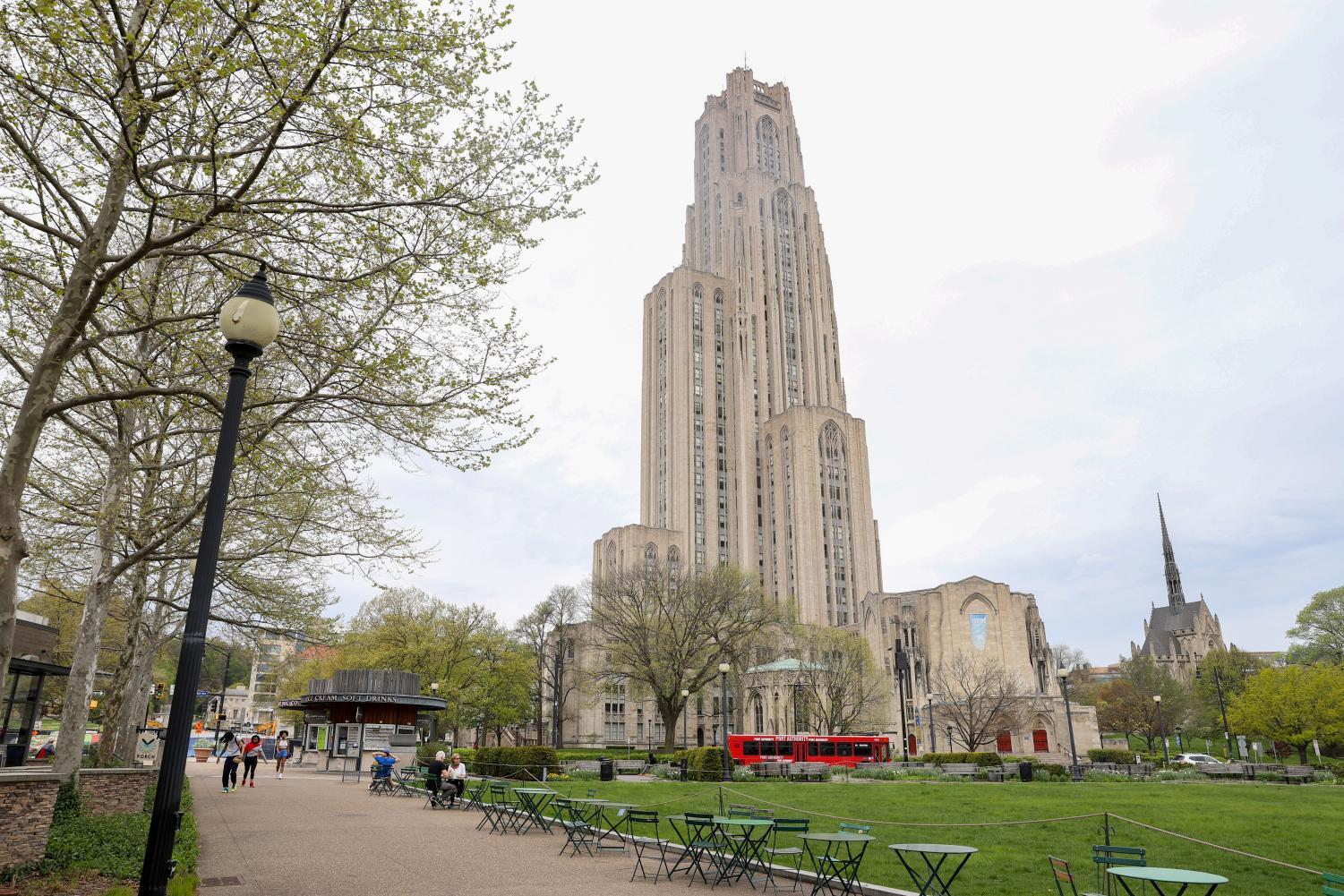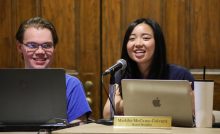Students advised to shelter in place for 10 days before Thanksgiving break, can still attend in-person classes


The Cathedral of Learning watches over an empty Pitt campus.
Pitt advised all students in a Monday morning email to complete a 10-day shelter in place starting Nov. 12 before leaving for Thanksgiving break.
The email from Pitt’s COVID-19 Medical Response Office said the shelter in place, beginning Nov. 12 for students living on and off campus, would be completed before Thanksgiving on Nov. 26, though classes end on Nov. 20 for Thanksgiving break. Students will not return to campus after Thanksgiving, instead finishing classes remotely through the end of the fall semester on Dec. 5.
During the shelter-in-place period, students are still permitted to attend in-person classes and other academic activities. The CMRO said students should only leave their rooms to attend in-person classes, labs or clinicals, pick up food, exercise safely, go to the library, work and shop for essentials and medical needs. It said attendance at all non-academic events, including home football games, is “discouraged.”
Pitt spokesperson Kevin Zwick said while the University “strongly [advises]” students to shelter in place, it isn’t required. He said Pitt is taking some measures to reduce high-risk situations, but is ultimately relying on students to follow the guidance.
“The University will take measures, such as moving to take-out only dining and closing certain high-risk activities and spaces, to help students make safe, smart decisions,” Zwick said. “Ultimately, we hope our students will take these steps out of concern and respect for the wellbeing of themselves, their family and their friends.”
Provost Ann Cudd said in a Monday email to faculty that Pitt will permit students to continue in-person academic activities during the shelter-in-place period. She said undergraduate and graduate classes will “proceed uninterrupted,” and that field and clinical work will continue as well.
This is a change from several weeks ago when Dr. John Williams, the head of Pitt’s COVID-19 Medical Response Office, said there would be no in-person classes regardless of the University’s operating posture during the shelter-in-place period, and that it would last for 14 days on campus.
Williams said at the time that there was no way to enforce the shelter-in-place rules for off-campus students, but he trusts Pitt students to make safe decisions. He said the Office of Residence Life has a team working to make shelter in place “feasible and easy” for on-campus students. He added that the CMRO is still developing plans for students to return to campus for the spring semester.
Zwick said this change is due to the shelter-in-place plan not being finalized at the time that Williams was speaking a week and a half ago. He said the CMRO ultimately decided that in-person instruction was safe to continue during shelter in place because of University precautions and because it determined social activities, not classes, were the main source of COVID-19 transmission.
“Nationwide and on the Pitt campuses, social activities in the community — and not in-person classes — have acted as a significant source of virus transmission,” Zwick said.
The CMRO said Pitt would close some public spaces that are “high risk or difficult to monitor or control” beginning Nov. 12. The closed spaces include dine-in campus dining, as well as gyms and recreation spaces, lounges and kitchens in residence halls. The spaces that will remain open include campus recreation facilities and campus-wide gyms with reservations, grab-and-go campus dining and University libraries.
Pitt moved to the Guarded risk posture last Monday, the lowest level of its three-tiered reopening system. While in this phase, most classes can be in person, some shared spaces are open, 25% of seating is open in dining halls and gatherings are capped at 250 people.
The Monday email also said students should spend at least four days of the shelter-in-place period at home to “ensure that you do not spread the virus when arriving at home.” Pitt “strongly [advises]” students to shelter in place for a total of 14 days before interacting with people at home without a mask or social distancing.
The CMRO said it recommends students limit all close contacts, wear a face covering and practice physical distancing “at all times” when around other people. It also said students should reestablish pods.
“This could be your original pod from campus arrival and move in, but may be different if your housing situation has changed since the start of the term,” the email said. “You could be unmasked in the presence of your pod mates. Avoid new close contacts.”
The CMRO said it recommends that students with family or friends that are at a higher risk for contracting COVID-19 at home should shelter in place as well as wear masks and maintain a physical distance even with their pod. It said this period is when students should socialize virtually.
“Ideally, all members of your pod and any other close contacts should shelter in place on the same days,” the CMRO said. “We realize that the end of semester is a temptation for parties, but such social gatherings have been the cause of many of the positive cases in our community.”
The email also said the University will not conduct mass testing for COVID-19 due to the risk of false negatives, but is “exploring options” to make at-home testing available to interested students.
Recent Posts
SGB introduces new governing code bill and addresses rumors of ICE on campus
At its weekly meeting at Nordy’s Place on Tuesday, Student Government Board introduced an omnibus…
Opinion | School should be in the summer
Although this may be controversial, I believe that from this data, it is evident that…
Weathering the storm: Pittsburgh teams have tackled some of the toughest environments
The end of the year in western Pennsylvania is always marked by two things —…
Notes From an Average Girl // Notes on Book Banning
In this edition of Notes From an Average Girl, senior staff writer Madeline Milchman writes…
To Be Honest // Yup, it is that damn phone
In this edition of To Be Honest, staff writer Evin Verbrugge writes about her phone…
Meaning at the Movies | Portraying Toxic ‘Adolescence’
In this edition of Meaning at the Movies, staff writer Lauren Deaton explores the mini-series…

